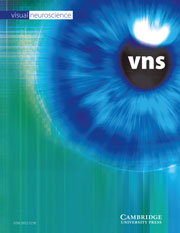Article contents
cGMP modulates spike responses of retinal ganglion cells via a cGMP-gated current
Published online by Cambridge University Press: 05 September 2002
Abstract
Certain ganglion cells in the mammalian retina are known to express a cGMP-gated cation channel. We found that a cGMP-gated current modulates spike responses of the ganglion cells in mammalian retinal slice preparation. In such cells under current clamp, bath application of the membrane-permeant cGMP analog (8-bromo-cGMP, 8-p-chlorophenylthio-cGMP) or a nitric oxide donor (sodium nitroprusside, S-nitroso-N-acetyl-penicillamine) depolarized the membrane potential by 5–15 mV, and reduced the amount of current needed to evoke action potentials. Similar effects were observed when the membrane potential was simply depolarized by steady current. The responses to cGMP are unaffected by inhibitors of cGMP-dependent protein kinase and Ca2+/calmodulin-dependent protein kinase. The response to cGMP persisted in Ca2+-free bath solution with Ca2+ buffers in the pipette. Under voltage clamp, cGMP analogs did not affect the response kinetics of voltage-gated currents. We conclude that cGMP modulates ganglion cell spiking simply by depolarizing the membrane potential via the inward current through the cGMP-gated channel. Modulation of this channel via the long-range NO-synthase amacrine cell may contribute to control of contrast gain by peripheral mechanisms.
- Type
- Research Article
- Information
- Copyright
- 2002 Cambridge University Press
- 13
- Cited by


